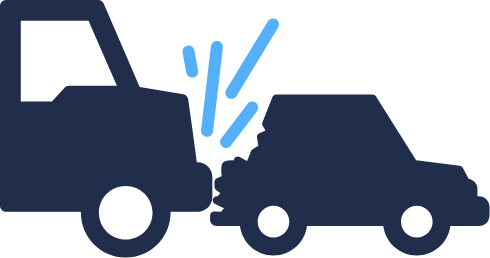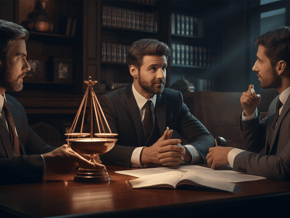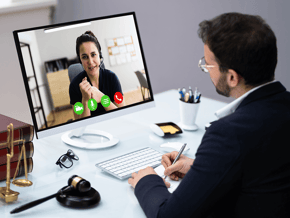Exploring the Pros and Cons of Buying Personal Injury Leads vs. Generating Them

In the ever-evolving landscape of legal growth marketing, acquiring personal injury leads is a pivotal challenge for law firms striving to expand their client base. When it comes to sourcing these potential clients, two primary strategies emerge: purchasing leads from specialized lead generation companies and cultivating leads in-house through strategic marketing efforts.
Each approach brings its own advantages and disadvantages that legal professionals must thoroughly analyze to make a well-informed decision that aligns with their growth ambitions, resources, and long-term vision for success. In this comprehensive exploration, we delve deep into the pros and cons of generating and buying personal injury leads internally, ensuring a comprehensive understanding of the potential impact on a law firm's growth trajectory.
Buying Personal Injury Leads
There are many sources online that promise access to lead directories and lists. These leads are usually not exclusive, and may or may not be vetted to fit your practice area.
Pros:
Time Efficiency: In the fast-paced realm of legal practice, time is a precious resource. Opting to buy personal injury leads from lead generation companies offers a considerable advantage in terms of time efficiency. These companies have honed their lead capture and qualification processes, streamlining the identification of potential clients who match the specific criteria set by law firms. The result is a significant reduction in the time and effort invested in initial prospect research and contact.
Immediate Access: Buying leads provides law firms with an instant pool of potential clients. This instant gratification can prove invaluable, especially during times when a firm needs to swiftly bolster its client pipeline to meet financial targets or seize opportunities within a competitive landscape.
Specialized Expertise:Legal lead generation companies specialize in the meticulous task of identifying and qualifying leads. Their expertise in this field ensures that the leads provided are well-aligned with the firm's criteria and needs. This specialization often translates to a higher quality of leads, potentially resulting in a more streamlined conversion process.
Cons:
Cost: While the efficiency and immediacy of buying leads are enticing, it comes at a cost. Acquiring high-quality personal injury leads from reputable lead generation companies can be a substantial investment. Law firms need to meticulously assess the cost against the anticipated return on investment, considering factors such as conversion rates and case values.
Quality Variability: Despite the efforts of lead generation companies to deliver quality leads, there's inherent variability in lead quality. Not all provided leads may align perfectly with a firm's desired criteria, potentially leading to inefficiencies and wasted resources during the follow-up process.
Competition: Leads purchased from lead generation companies are often shared with multiple law firms, resulting in increased competition for the same pool of potential clients. This heightened competition can affect a firm's ability to secure new cases and clients, making it crucial to stand out in a crowded field.
Generating Personal Injury Leads In-House
While bulking up your marketing department can be costly, it gives you a more consistent way to generate leads within your own practice. Let’s explore the pros and cons of this approach to lead generation.
Pros:
Tailored Targeting: Cultivating personal injury leads in-house gives law firms more control over lead targeting. This approach enables firms to tailor their marketing efforts to focus on specific demographics, locations, or case types, increasing the likelihood of attracting high-quality leads that closely match the firm's ideal client profiles.
Cost Control: While developing an in-house lead generation strategy requires an initial investment, it is often more cost-effective over the long term than purchasing leads. Once established, the ongoing cost of generating leads internally is generally lower than the recurring expenses of buying leads.
Brand Building: Internal lead generation efforts contribute to brand building and industry authority. Crafting and executing effective marketing campaigns attracts potential clients and positions the firm as a reputable and knowledgeable resource within the legal landscape. This branding impact can lead to increased trust and engagement among potential clients.
Cons:
Resource Intensive: Generating personal injury leads in-house demands dedicated resources, including skilled marketers, advanced technology, and specialized tools. For growing law firms with limited resources, the commitment required for successful internal lead generation can be substantial and potentially prohibitive.
Learning Curve: Establishing an effective lead generation strategy involves a learning curve, especially for firms new to digital marketing practices. Law firms might need to invest time and effort into understanding the intricacies of online marketing, lead nurturing, and data analysis to optimize their efforts.
Time-Consuming: The process of developing and implementing an in-house lead generation strategy is inherently time-consuming. Crafting compelling content, creating optimized landing pages, running targeted campaigns, and fine-tuning your lead nurturing efforts require significant time and energy.
Summary
In the multifaceted world of personal injury law, the journey to acquire potential clients takes two distinct routes: buying leads from lead generation companies or nurturing leads internally through strategic marketing initiatives. The decision between these approaches is complex and pivotal, directly impacting a law firm's growth trajectory, operational efficiency, and overall success.
Buying leads presents notable advantages in terms of time efficiency, immediate access to potential clients, and the specialized expertise of lead generation companies. However, these benefits are tempered by the cost of acquisition, potential variability in lead quality, and the increased competition among law firms vying for the same pool of purchased leads.
On the other hand, generating leads in-house offers unique strengths, such as tailored targeting, cost control, and the opportunity for brand building and industry authority. Yet, this approach demands substantial resources, requires an investment in learning and skill development, and necessitates a patient approach due to the time-consuming nature of the lead generation process.
Conclusion
Ultimately, the decision between buying personal injury leads and generating them in-house hinges on a firm's unique circumstances, growth goals, available resources, and appetite for innovation. Some law firms may opt for a hybrid strategy, blending both approaches to capitalize on the advantages of each.
Legal Growth Marketing offers you the best of both worlds, giving you in-house control over lead generation with the ease of purchased leads. This approach will guide your practice toward sustained growth and success in the competitive landscape of personal injury law. Book a meeting to learn more about how we can help your practice grow!



